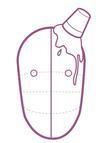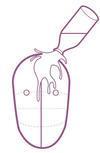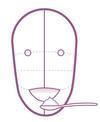
The trend (also known as neck and nominate) is thought to have originated in Australia and involves someone filming themselves downing an alcoholic pint (normally beer) before nominating two or three others to do the same. As the nominations spread around the world the drinking videos got more intense both in terms of the content of the drink (mixing spirits, wine and beer) as well as the con text (extreme ones have seen people do it in public places, water slides, wearing either a lot, or little clothing).
It has been reported that five men have died in 2014 thus far because of the challenge. These include Irish teenager Jonny Byrne who jumped into a river during his challenge, and Bradley Eames who died four days after filming himself drink two pints of gin. Eames’s mother posted a link to another death online saying, ‘You all need to stop now!!!’ Detectives have spoken to the person who nominated Isaac Richardson before his death, and lawyers have warned that people who nominate could face manslaughter charges if the nominations result in a death.
The craze has drawn widespread criticism. Sixteen year old Megan from Essex was hospitalised following a nomination and her mother Dawn said: ‘It is cool [for teenagers] to put their life in danger. She is lucky to be alive. Parents need to be really vigilant about this craze.’ Rugby player Samson, who was one of the first to send the meme viral has distanced himself from it. He told the Sunday Mirror: ‘It has gone too far. This was not how it was supposed to go. In light of the deaths of people taking it too far, I would rather not be attached to it in any way, any more.’
Figures have been released recently showing that deaths from alcohol poisoning have gone up by 200 per cent over the last decade in England and Wales. Accidental alcohol deaths killed 396 people in 2012, compared to 157 in 2007 according to the Office for National Statistics (ONS). Olugbenga Olatunde, a researcher for the ONS said, ‘It is possible in the future we will get a lot more of these deaths because of games like NekNominate.’ The chief executive of Alcohol Concern, Eric Appleby said: ‘The huge rise in deaths from accidental alcohol poisoning shows that we’re still not getting the message that drinking too much can be lethal. We have to face up to our problem with alcohol and challenge the idea that being drunk is an essential part of having a good time.’
INTERNET FADS: WHAT AND WHY?
NekNominations are just the latest in a series of internet trends to have swept across young people’s timelines and newsfeeds over the last couple of years. Here’s a guide to some of the big ones:
PLANKING:

The grand-daddy of internet fads, planking went viral in 2009 when pictures of people lying face down in unusual locations spread across the
world, before disappearing after the death of Acton Beale who died after ‘planking’ on a seventh f loor balcony in Australia. Planking gave birth to similar memes such as ‘Hadoukening’ (standing in a public place like characters from Street Fighter) and ‘Tebowing’ (kneeling in a way similar to NFL-star Tim Tebow).
CONING:

Coning stepped in to the vacuum left by planking, and was merely the simple act of going to a McDonalds drive-through, ordering an ice cream cone, and slamming it onto your forehead (while remaining deadpan) and driving off.
MILKING:

In a similarly dairy-vein to ‘coning’, milking saw people around the world filming themselves in public places emptying cartons and bottles of milk over their head without reacting.
THE CINNAMON CHALLENGE:

As Mary Poppins would have said if she’d lived to see Buzzfeed: ‘A spoonful of cinnamon helps the video go viral’. The cinnamon challenge sees people filming themselves eating a spoonful of cinnamon powder, before inevitably spitting it all out in a ‘hilarious’ fashion.
But why are these memes so popular, and why are teenagers so willing to humiliate themselves on the internet? Clive Martin, writing for Vice.com, has an interesting theory:
‘Due to a variety of factors – ranging from the post-iPod acceptance of all music, to rising shop rents that equal a monopoly of big chains and their uniform stock – young people feel they have very little ownership over anything. In consensus, coalition, resolutely capitalist Britain, youth subcultures are processed in the same way as veal. They’re snapped up by trend forecasters before they’ve had a chance to grow, locked in a dark room, sold to the high-street butcher and f logged back to the kids at inflated prices. We saw it with Libertines-era indie, dubstep and Odd Future. They should have had a chance to mature and actually make some kind of dent on mainstream culture, but they were all denied that by the collective lack of patience you’d expect of a society used to 4G. Of course, you can’t do that with these internet crazes, because there’s no way to monetise drinking a pint full of grasshoppers or getting your mates to pepper spray you in the face. They remain one of the last things in our society that are essentially unmarketable. Very few brands are going to encourage you to drink engine oil any time soon – they don’t want a shout out at your funeral, they want your money. NekNominate doesn’t, and it remains nihilistically enticing for that.’
Clive Martin’s whole piece on the NekNominate phenomena is available at http://www.vice.com/en_uk/read/neknominations-are-the-last-subculture
‘“Generation Wuss” [is] you, me, and everyone else who’s young...hyper-sensitive, and has grown up with the internet. When I hear “millennials” getting hurt by “cyber-bullying”, or it being a gateway to suicide, it’s difficult for me to process. It’s very difficult for them to take criticism...and when someone is criticised...they seem to collapse, or the person criticising them is called a hater, a contrarian, a troll. What we have is a generation who are super-confident and super-positive about things, but when the least bit of darkness enters their lives, they’re paralysed.’ THE CONTROVERSIAL VIEWS OF BRET EASTON ELLIS, AUTHOR OF AMERICAN PSYCHO.






































